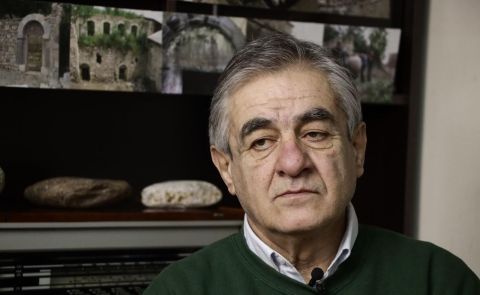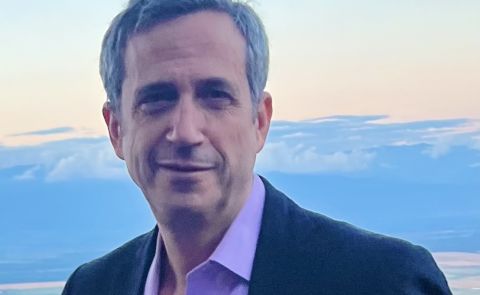
Ali Mousavi Khalkhali: Iran Will Avoid Conflict in the Caucasus

As the HTS militia entered Damascus with Turkish support in December 2024, Iranian forces were leaving a power base they had held for decades. The Astana framework, which positioned Iran in a Concert of Power with Russia and Turkey, was demolished. The question is: what are the consequences for the Caucasus? To reach some preliminary conclusions, we turned to journalist Ali Mousavi Khalkhali.
An old adage suggests journalists should not be part of the story. However, Ali Mousavi Khalkhali, the Chief Editor of the Iranian Diplomacy website, is in weekly contact with the Iranian diplomatic corps and foreign delegations visiting Tehran. From his position, he has a bird’s-eye view of how the foreign ministry operates across departments. He is well-placed to monitor the effects of recent events in Syria and Lebanon on the Caucasus.
Let’s start with the basics. One of the primary concerns of the region is the completion of the International North-South Transport Corridor. Is the long-delayed Rasht-Astara railway connection ready? What is the state of play in developing the International North-South Corridor? As the second Trump administration is not extending the exemption of the Chabahar Port from sanctions, is the project still viable?
You will not be surprised to hear that the Rasht-Astara railway connection remains perennially under construction. Tehran blames the Russian side for not upholding its end of the bargain and failing to invest. That is what the head of the Gilan Provincial Chamber of Commerce, Farhad Nazari, suggests. He deflects all criticism, calling on the Russians to honor their investment pledge. The loan that the Russian side promised has not been disbursed. The Iranians are very interested in building this railway, but for many reasons, including sanctions, they do not have the capital to invest. When addressing the media, the Russians blame Tehran for failing to deliver on the project.
Tehran also faces an internal power struggle and disagreement over whether a railway connection transiting via Azerbaijan is a good idea. Because the relationship between Tehran and Baku is not reliably cooperative, a faction argues that the focus should be on the Rasht-Anzali railway route. From the Anzali port, goods could be delivered, bypassing Azerbaijan and removing Baku’s leverage over the corridor. Mustafa Taati Moghadam, CEO of the Anzali Free Zone, says that Bandar Anzali is the deepest area of the Caspian Sea, through which the North-South Corridor can be connected to Russia, perhaps in parallel with the Bandar Anzali-Rasht-Astara connection. This would create three transit routes: one via Gilan Province in northern Iran, another through Azerbaijan to Russia, and the third through Bandar Anzali directly to Russia.
The construction of the North-South Corridor project remains an ongoing objective and ambition. The project is important for Russia to evade sanctions as the war in Ukraine evolves, and diversifying supply chains remains a priority. Sanctions weigh heavily on both sides.
The Chabahar Port remains a viable end destination for the corridor because it is valued by Russia and endorsed by all Central Asian countries. These states, which do not have access to the open seas, see Chabahar as a launchpad for the world economy. Sanctions stand in the way, but the project remains viable. The Russians say that Chabahar is an integral part of that vision.
Did the death of Raisi cast a shadow on the Azerbaijan-Iran relationship?
I don’t think so, because Iran’s foreign relations go beyond specific individuals. I don’t believe President Raisi’s death will impact Iran-Azerbaijan relations.
Telegram channels speak of a Shia militia along the Azerbaijani border gaining access to radar and monitoring activity across the Aras River. Following the events in Syria and Lebanon, has the Iranian military posture vis-à-vis Azerbaijan changed?
Of course not. Iran has an enormous Turkic-speaking minority and a civilizational connection to Azerbaijan. However, counterbalancing the combined influence of Azerbaijan and its close ally, Turkey, is now a more urgent consideration.
What was the political message of the joint naval exercises between Iran and Azerbaijan in November 2024 in the Caspian Sea?
This exercise was a confidence-building measure, with Tehran asserting that it does not present a threat to Baku. Iran is a vast country with considerable military power in the region. It has always tried to position itself as a ‘father’ to smaller countries in the region, including Azerbaijan and Armenia, which it sees as part of its civilizational sphere.
Iran has always supported Armenia’s military logistics but was never quite a military ally that would offer security guarantees in terms of collective defense. Has this changed?
No. Iran will remain Armenia’s facilitator in military logistics. However, as long as Iran faces tension with Israel and the United States, it cannot afford—and does not have the power—to engage in a conflict in the Caucasus. Azerbaijan’s close partnership with Israel means Iran must avoid triggering a conflict. Russia supports Iran’s logistical support for Armenia as long as Armenia does not become militarily dependent on Iran and Russia’s influence over Armenia is not affected.
With Turkey’s help as a regional power, Azerbaijan has managed to attract Pakistan’s support, mirroring deep trilateral cooperation. Armenia has sought Indian support. As a regional power rival to Turkey, Iran is facilitating this cooperation. In other words, what we have is Azerbaijan-Turkey-Pakistan cooperation versus Armenia-Iran-India cooperation. Just as Azerbaijan has given many concessions to Pakistan, Armenia has given many concessions to India. Interestingly, the United States and France also back India’s presence in the Caucasus.
Is the end of Turkish-Iranian cooperation in Syria of any consequence to the Caucasus?
Tehran and Ankara do not enjoy mutual trust. That is a tangible consequence of what happened in Syria, which applies to the Caucasus. Iran considers the Caucasus part of its “civilizational sphere.” The primary objective is to avoid the expansion of Israeli and U.S. pressure. That is why Iran will continue to cooperate with Turkey in the Caucasus.
How do Iranian diplomats and the security establishment view the conclusion of the recent Armenian-Azerbaijani agreement?
Right now, Iran is willing to support any and every peace process between Azerbaijan and Armenia. Iran views every tension in the region as an immediate threat to its sovereignty, giving cause for potential intervention by its powerful enemies, Israel and the United States. Therefore, Tehran supports any peace that leads to the resolution of tension. Suspicion abounds vis-à-vis everyone.
In a conversation I had with Ali Saghaian, former Iranian ambassador to Armenia, and Abbas Mousavi, former Iranian ambassador to Azerbaijan, both emphasized that peace between Azerbaijan and Armenia could be the best possible development for Tehran. Iran would not be pressed to choose one over the other. It would also reduce the need for and leverage of Israel and the United States in the region, which favors Iranian interests.
Russia’s foreign minister, Sergei Lavrov, was recently in Tehran, offering to mediate with Washington. Is this a viable prospect?
Moscow’s offer to mediate is generally welcome, but Tehran is probably unwilling to accommodate Washington’s fundamental demands, and vice versa. This is not likely to yield tangible results.
Interview conducted by Ilya Roubanis
See Also


Irina Mamulashvili: Electoral Interference is a Playbook, not a Recipe

Giorgi Gakharia: The EU Should Engage Georgia Despite Its Democratic Backsliding

Peace or Capitulation? Shahverdyan on Armenia-Azerbaijan Agreement and the Nagorno-Karabakh Crisis

Aram Suren Hamparyan: Let’s Not End Up With Less Land and Less Peace

